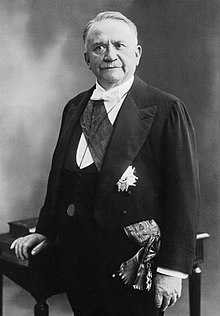Gaston Doumergue
Pierre Paul Henri Gaston Doumergue (born August 1, 1863 in Aigues-Vives , Département Gard , † June 18, 1937 there ) was a French politician and president during the Third Republic .
Initially a member of the Radical Party , Doumergue developed into a conservative in the course of his life. He was Prime Minister from 1913 to 1914 and President of the Republic from 1924 to 1931. In 1934 he was again prime minister of a conservative cabinet of national unity.
Early career
Gaston Doumergue, born in southern France in 1863 as the son of an old Protestant winemaking family, studied law and then worked as a lawyer. He then worked as an administrative officer in Indochina and Algeria .
In 1893 he was first elected to the French Chamber of Deputies for the Gard department . There he had many friends because of his wit, tolerance and aversion to any kind of doctrinalism. From 1902 he was represented as a minister in almost every cabinet before he became prime minister himself for the first time from 1913 to 1914.
In 1917 Doumergue was appointed Colonial Minister. As such, he traveled to Petrograd on February 12, 1917 and wrote the most spectacular chapter in the history of French war aims without the knowledge of Britain's Entente partner . Doumergues' offer to Russia to freely define its western border was an attempt to prevent this allied from reaching a separate peace with the German Reich . On February 14, 1917, Russia in turn assured France that it would support France's demands. France was granted not only Alsace-Lorraine , but also an area the size of the former Duchy of Lorraine with the Saar Basin, the unannounced areas on the left bank of the Rhine "should form an autonomous and neutral state" under French protection, which was to remain occupied until all peace conditions were met .
Doumergue later moved from the Chamber of Deputies to the Senate , where he was president from 1923 to 1924. This high post proved advantageous for his presidential candidacy the following year, as his opponent Paul Painlevé , the candidate of the left-wing parties, had only a small majority in the National Assembly.
Presidency 1924 to 1931
Due to his moderate, almost conservative attitude, he achieved a majority of 515 to 309 votes in the election on June 13, 1924, making him the first Protestant to be elected President of the French Republic. However, due to the majority in the National Assembly, the left-wing politicians Édouard Herriot , Paul Painlevé and Aristide Briand formed the governments in the first two years of his presidency . It was not until 1926 that he was able to commission Raymond Poincaré to form a government. This managed to bring the threatened economic situation back into balance.
In terms of foreign policy, Doumergue pleaded for a resolute policy towards Germany in view of the emerging nationalism there. In the Rif War in Morocco, he installed Marshal Philippe Pétain as Commander-in-Chief, who was able to successfully end the war against the proclaimed Rif Republic in 1926 . Just like when he was a MP, Doumergue was also very popular as President. Nevertheless, he turned down a new candidacy and retired after the end of his presidency on July 13, 1931 back to southern France.
After the riots of February 6, 1934 , the former president once again formed a government of national unity as prime minister. In November 1934, however, at the age of 71, he resigned from this office because the co-governing Radical Socialists did not approve a project to dissolve the National Assembly and to change the state budget.
Web links
- Newspaper article about Gaston Doumergue in the 20th century press kit of the ZBW - Leibniz Information Center for Economics .
swell
- Claude Schaeffner (Ed.): World history in pictures. Volume 23: Madeleine Stahlberg: The Treaty of Versailles, the post-war period, European dictatorships. Gondrom, Bayreuth 1982, ISBN 3-8112-0250-2 .
- Bruce P. Lenman, Trevor Anderson (Eds.): Chambers Dictionary of World History. Revised & updated edition. Chambers Harrap, Edinburgh 2002, ISBN 0-550-13000-4 .
| predecessor | Office | successor |
|---|---|---|
|
Louis Barthou Édouard Daladier |
Prime Minister of France December 9, 1913 - June 9, 1914 February 9, 1934 - November 8, 1934 |
Alexandre Ribot Pierre-Étienne Flandin |
|
Stéphen Pichon René Viviani |
Foreign Minister of France December 9, 1913 - June 9, 1914 August 3, 1914 - August 26, 1914 |
Léon Bourgeois Théophile Delcassé |
| Aristide Briand |
Minister of Education of France January 4, 1908 - November 3, 1910 |
Maurice-Louis Faure |
| Léon Bourgeois |
President of the French Senate February 22, 1923 - June 13, 1924 |
Justin de Selves |
| personal data | |
|---|---|
| SURNAME | Doumergue, Gaston |
| ALTERNATIVE NAMES | Doumergue, Pierre Paul Henri Gaston (full name) |
| BRIEF DESCRIPTION | President of the Third French Republic |
| DATE OF BIRTH | August 1, 1863 |
| PLACE OF BIRTH | Aigues-Vives (Gard) |
| DATE OF DEATH | June 18, 1937 |
| Place of death | Aigues-Vives (Gard) |


